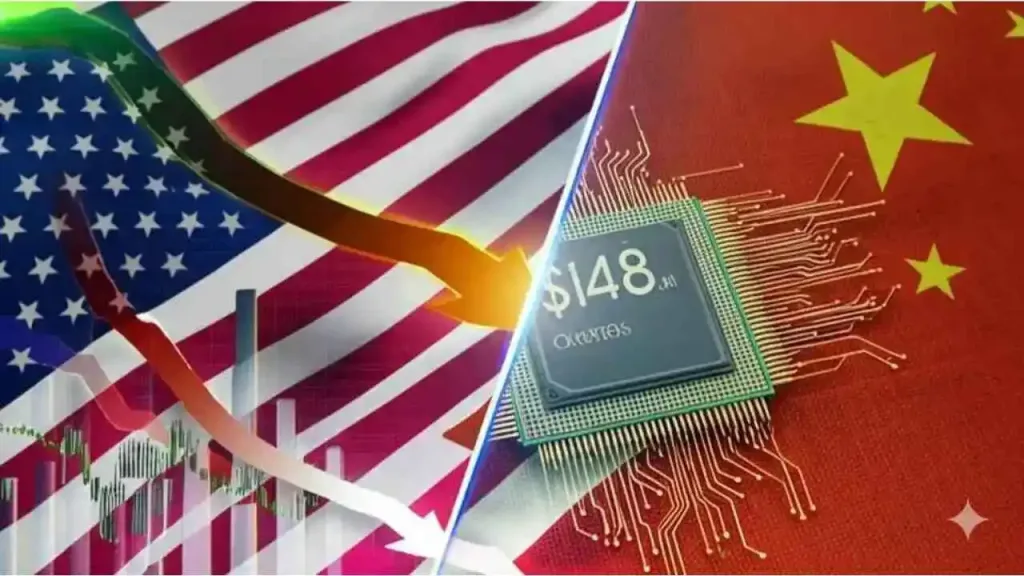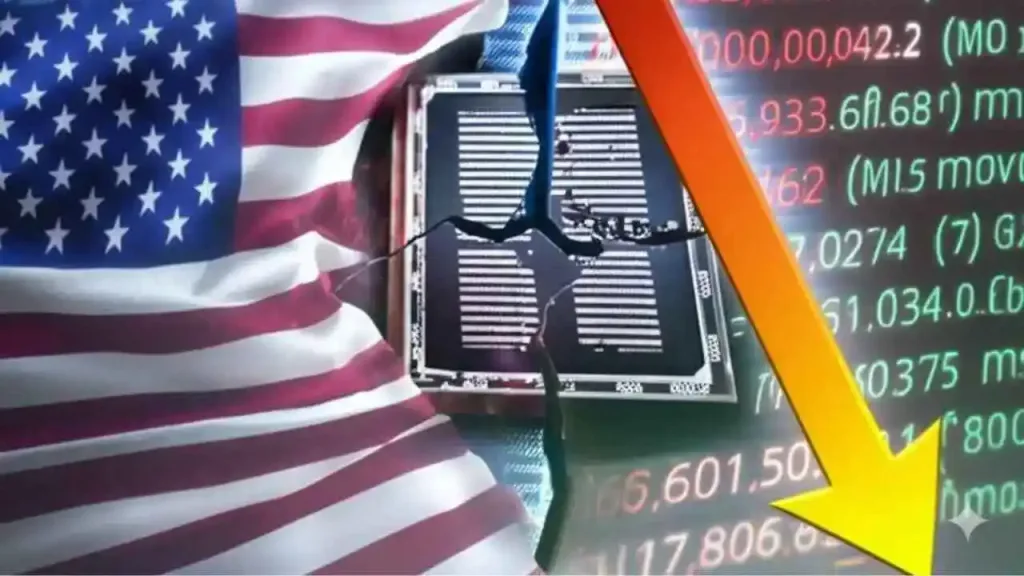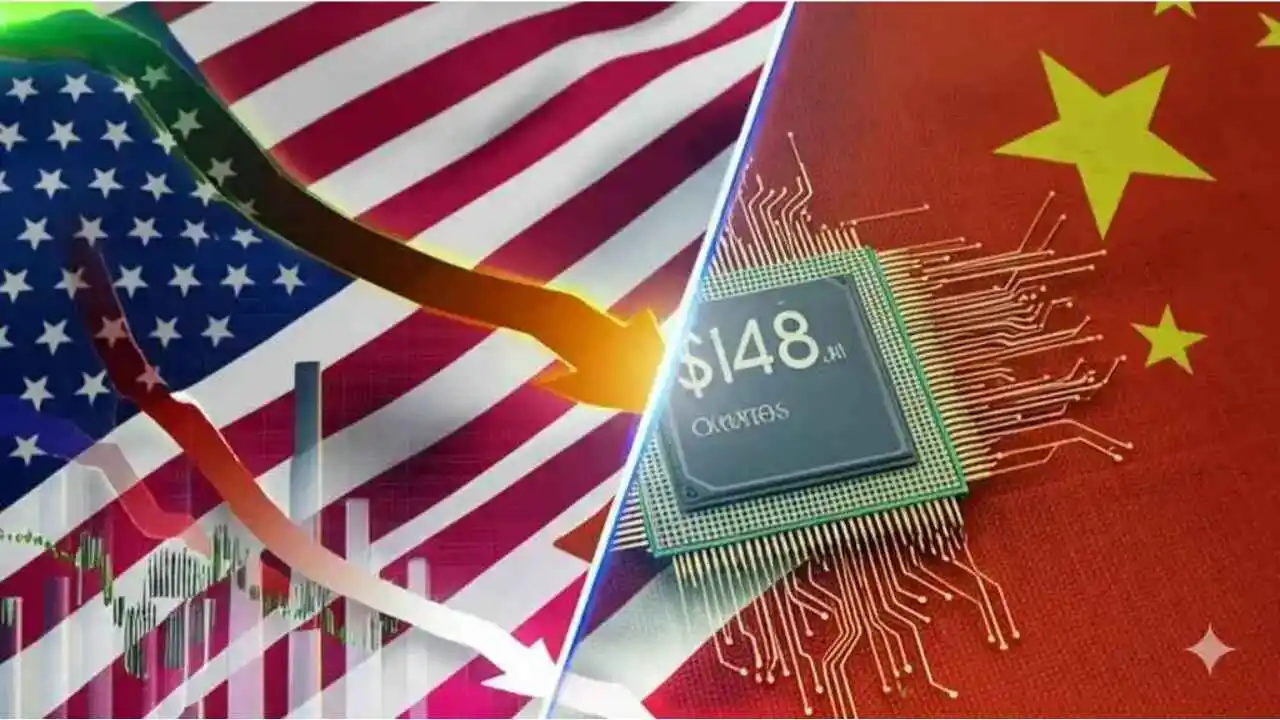Global Trade Disruption Hits the Semiconductor Industry: N Media’s $148 Billion Loss
Greetings, friends, and welcome to Baatein Bazaar Ki. I’m Ankit Awasthi, and today we’re diving into a critical development that’s sending shockwaves through the global market—especially in the tech sector. The ongoing U.S.-China trade conflict has taken another significant turn, this time resulting in a jaw-dropping $148 billion loss for an American semiconductor giant, N Media. This staggering loss in just a single day exceeds the entire valuation of India’s top startups combined. But what exactly led to this colossal plunge? Let’s take a deeper look.

N Media: The Backbone of Global Electronics
At the core of this story is N Media, a company that plays a pivotal role in the world of semiconductors. N Media manufactures chips that are embedded in nearly every electronic device—whether it’s the laptop or smartphone you’re using right now, or the complex systems powering AI and robotics. These chips are integral not only for everyday gadgets but also for cutting-edge technological advancements such as artificial intelligence (AI) and autonomous vehicles.
The importance of N Media’s products cannot be overstated. However, recent geopolitical tensions, particularly between the U.S. and China, have led to a massive disruption in its stock value, igniting concerns about the company’s future. Let’s explore what’s driving these events.
U.S.-China Trade War: The Latest Escalation
On April 9, the U.S. government made a bold move by imposing a ban on the export of certain chips to China. This decision is part of a broader strategy aimed at curbing China’s progress in AI and high-tech industries. These chips are integral to China’s AI development, and by halting their export, the U.S. seeks to slow down China’s technological advancements—especially in areas vital for both economic and national security.
This latest twist in the trade war comes after years of escalating tensions between the two superpowers. Initially, the conflict centered around tariffs, but now it has evolved into a more direct attack on each other’s technological capabilities. For N Media, a company at the intersection of these tensions, the impact has been swift and severe.
The History of N Media: A Giant in the Semiconductor Industry
Founded in 1993 by Gentian Hua, N Media is a leading player in the semiconductor industry. Based in Silicon Valley, the company has grown to become a global leader in chip design and manufacturing. N Media’s chips are not just limited to consumer electronics but are also crucial in the development of AI, robotics, and even the gaming and cryptocurrency industries.
N Media has always been a key contributor to the U.S. tech sector and is a major player in global markets. The company operates multiple engineering centers in India, including in Hyderabad, Gurugram, and Bangalore, further cementing its international footprint. In terms of market capitalization, N Media has consistently ranked among the top companies globally, often in the top five, rivaling tech giants like Apple and Microsoft.
When Donald Trump assumed office, there were high hopes that American companies like N Media would benefit from increased investment and a stronger domestic market. However, the trade war with China shifted the landscape dramatically. Under Trump’s “America First” policy, tensions flared over issues like intellectual property theft, technology transfer, and the rise of Chinese tech giants. The semiconductor industry, especially, became a flashpoint.

The Tariff War and the Battle for Technological Supremacy
As we’ve seen in previous sessions, the U.S. imposed tariffs on Chinese goods, and China retaliated in kind. But the situation has escalated further with the U.S. restricting access to critical technology, including semiconductors. The U.S. government’s recent decision to block the export of key chips to China is seen as a strategic move to prevent China from advancing its AI capabilities, which are viewed as a direct challenge to U.S. dominance in the tech and defense sectors.
One of the most significant actions taken by the U.S. government was to ban exports of certain semiconductors made by N Media, which are vital to AI development. N Media’s chips, which are used extensively in AI applications, were stopped in their tracks—making it more difficult for China to continue developing its cutting-edge AI systems. This move is expected to have far-reaching consequences, not just for N Media but for the global semiconductor industry.
The $148 Billion Loss: Market Reaction and Implications
The immediate impact of the U.S. ban was felt on Wall Street, where N Media’s stock price plummeted by nearly 7%, wiping out $148 billion in market value. This drastic loss is even more striking when compared to the valuations of India’s leading startups, which collectively fall well below this figure. The stock price, once trading at $148 per share, has now fallen to $104, reflecting the market’s shock and uncertainty.
The reasons behind this dramatic decline are twofold: the immediate halt in exports to China and the broader uncertainty surrounding the U.S.-China trade war. N Media’s chips are a crucial component of China’s tech infrastructure, and without access to these products, China’s AI development could slow down significantly. As AI and advanced technologies become increasingly integral to global power dynamics, the stakes couldn’t be higher.
The Broader Strategic Picture: AI and National Security
The U.S. government’s actions are not just about tariffs or trade imbalances—they reflect a much larger battle for technological supremacy. AI is rapidly becoming a critical component of national security, and the ability to control the development of AI has enormous implications for global power structures.
By restricting China’s access to advanced semiconductors, the U.S. is essentially trying to cut off a vital lifeline to China’s technological ambitions. This isn’t just about protecting American companies—it’s about maintaining the U.S.’s edge in the global AI race. However, it’s important to note that China is not standing still. Despite these challenges, China has made significant strides in developing its own semiconductor capabilities, and it’s likely that the country will continue to innovate in the face of these restrictions.
What Lies Ahead: The Future of N Media and Global Tech
Looking forward, the question remains: How will N Media navigate this turbulent landscape? Will the company be able to find new markets or solutions to mitigate the damage caused by the U.S. ban? The future of N Media—and the broader semiconductor industry—will largely depend on how the U.S.-China trade war evolves and how quickly China can ramp up its own semiconductor production capabilities.
One thing is certain: the global semiconductor market will continue to be a hotbed of geopolitical conflict. As nations vie for technological dominance, companies like N Media will remain at the center of these struggles. For investors and tech enthusiasts alike, the next few months will be crucial in determining how this high-stakes battle plays out.
